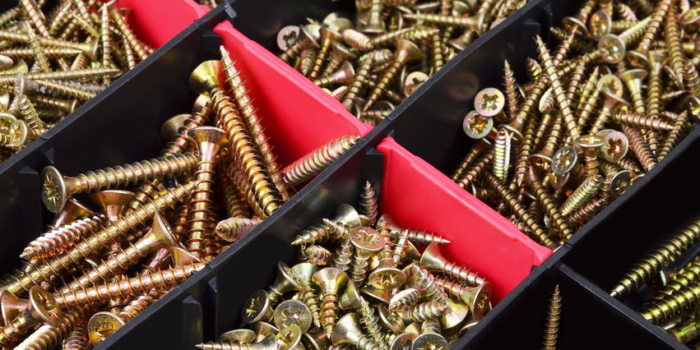If you’ve ever visited a hardware store and gotten swept up in the fastener section, you understand how overwhelming this can be. Choosing small screws is intimidating, even for highly trained professionals. With a myriad of micro screws to choose from, it can get a little confusing.
Check out our EZ Screw Builder to build your custom screw!
Early screws were handmade, with every screw having its own definite shape. However, that changed in 1928 after the National Screw Thread Commission came up with a standard for screw threads for interchangeability. Today, there are millions of miniature screws — and there’s no way we can cover them all. However, we’ll give a synopsis of the different types of popular screws and their uses.
Different Types of Screws
Finishing Screw – These screws are used instead of nails for a smooth trim. The rounded, sleek screw head immerse itself into the wood. The small head needs a Torx or square drive.
Wood Screw– Explicitly manufactured for smooth wood finish, these types of small screws are designed with medium to coarse threads with a smooth portion of the shank. The shank allows the micro fastener to slip effortlessly through the top fabric. Commonly, the wood screw has a flat head.
Machine Screw – This is technically a bolt due to the blunt tip. It’s used in threaded holes or with nuts. However, it’s not ideal for driving into the wood.
Timber Screw – They’re used in place of lag screws, framing anchors, and structural nails. They have a coarse thread.
Drywall Screw – primarily designed for fastening steel framing, drywall, or wood. Inexpensive and used in a range of projects.
Choosing the Right Screw Size
With so many small screws in the world, getting the right size is problematic. Apart from considering the quality, getting the right size is crucial. But how do you arrive at the right size? If you’re not sure about the process, we’ll give you some useful information on how to determine screw size & screw strength.
Bearing Load
Undoubtedly, this is the first factor you should consider before you buy small screws. If the load that will bear the screw is huge or it will probably get exposed to high forces, then nuts and bolts will be ideal. Figure out the force that will be transmitted to the screws then get the right size to accommodate this.
Oscillating Joints
Oscillating joints need sturdy screws that will withstand the force. You need to know the capacity of the screw, how much force it can take, and the safety it can provide. This way, the joint will last for longer. There are strong and durable tiny screws with a great capacity to keep the joints intact.
Load Change
With time, the load might change. Therefore, as you use the screw, ensure it can withstand changes in loads. Buy a fastener that will endure any force transmitted to it.
Choosing the screw size is an uphill task, but much possible. If you consider the above tips, you’re guaranteed to choosing quality products.
Screw Material
Are you using the screw for indoor or outdoor purposes? Outdoor screws are quite big and strong to withstand the outside force. They need to be protected against corrosion from temperature change and severe weather conditions. Therefore, stainless steel is the perfect material.
For indoor use, you might decide to choose a smaller size since they are not mostly subjected to great force. You can use a material coating or buy inexpensive zinc screws.
As a reliable supplier of custom manufactured micro screws, we take pride in vast experience under their belt. With us, you’re guaranteed of any size, design, and thread you want. Apart from producing miniature screws, we will deliver the products to your doorstep. More so, we are not limited to big projects. Our flexibility allows us to provide custom fasteners to both large and small organizations.
Today, we are the leading small screw suppliers who strike a balance between affordability and quality. Call us today for your custom made screws.

